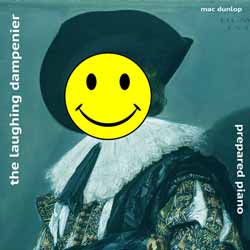|
Click here to return to the main site. Classical Music Review
Mac Dunlop gives us 6 prepared piano improvisations (33 min, 18 sec) responding to the unique character of a Yamaha U2 upright at Jubilee Warehouse in Penryn, Cornwall... I have to admit that I'm not normally a fan of classical music pieces that push the boundaries of melody and traditional structure. If it sounds like someone messing around without really knowing what they're doing then it's off in avant-garde territory and not something I get anything out of. For me classical music has to stir an emotional response to make it noteworthy... not frustrate and bore me. So, when I started playing Mac Dunlop's The Laughing Dampenier I sighed a little. Don't get me wrong. I'm well aware of the merits of this style of music, but it does nothing for me and it's certainly not the sort of thing I can listen to very often. Track 1. 'Got it Govinda' opens the session with an exploration of dampening technique, bringing sound modulations to the instrument through acoustic means only. The second track, 'Bell(e)s', really caught my attention. It opens with the sound of a ring of bells from St. Gluvias church, and then Dunlop plays piano like the sound of ringing bells. If anyone has ever been involved in campanology (my girlfriend used to go bell ringing at our local church) then they'll immediately understand how clever this track is. This piece was born when the Bells of St. Gluvias rang during the Laughing Dampenier session, with the peals and modulations inspiring the improvisation. Track 3, 'The Laughing Dampenier' is interesting as the piano dampener had a slight scratch when activated which results in a squeaking/chuckling sound, and is used rhythmically in the improvised piece 'Thief Key' is a text poem and a tonal poem. Ah, poetry... my absolute all time pet hate. I truly can't abide poetry. It's lazy writing, in my book... but here Dunlop improvises giving us some bizarre outpourings: "Our home made organic stone tears..."; "The secret is death"; "Massive hair spray, yellow"; "All animals are fake"... It's raw and very much in the moment, and for capturing a pure and honest slice of inspiration you can't help but be impressed by how bold and open Dunlop is. 'Bill Etude' is a movement around tonality, recognizing the influence of Bill Evans (1929-1980), the American jazz pianist and composer. This is arguably the album's highlight and represents a rather moving tribute to the great man. 'Unbreath' is an improvisational piece that closes the album... which pretty much leaves us where we came in. I have to admit that I probably enjoyed this a little more than I should have - considering my dislike of avant-garde music and poetry - and I really got behind 'Bill Etude'. As improvisational works go, this is well balanced and has enough quirky pieces to make it worth checking out if you're a fan of that sort of thing. 7 Darren Rea |
|---|
